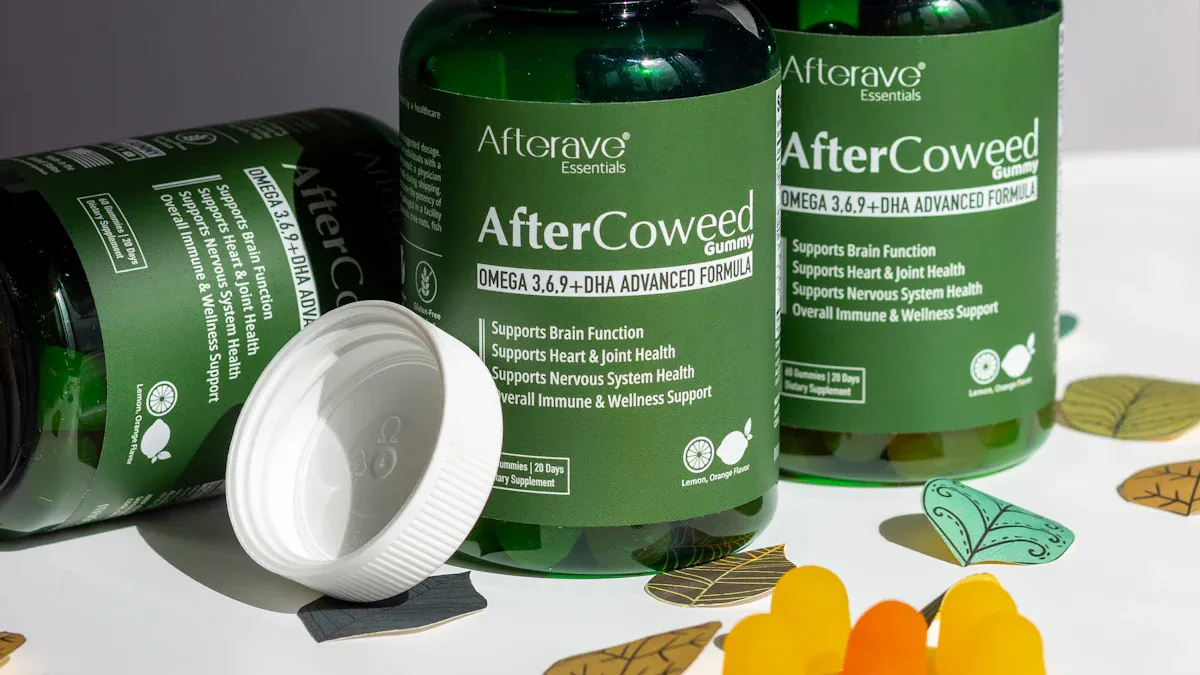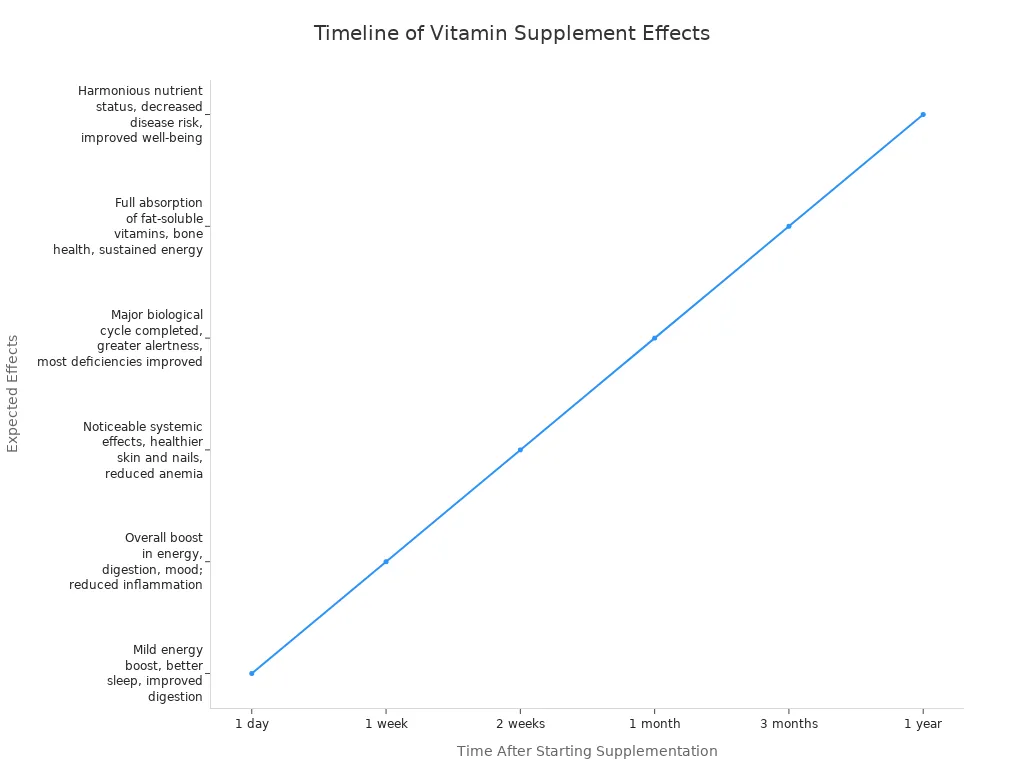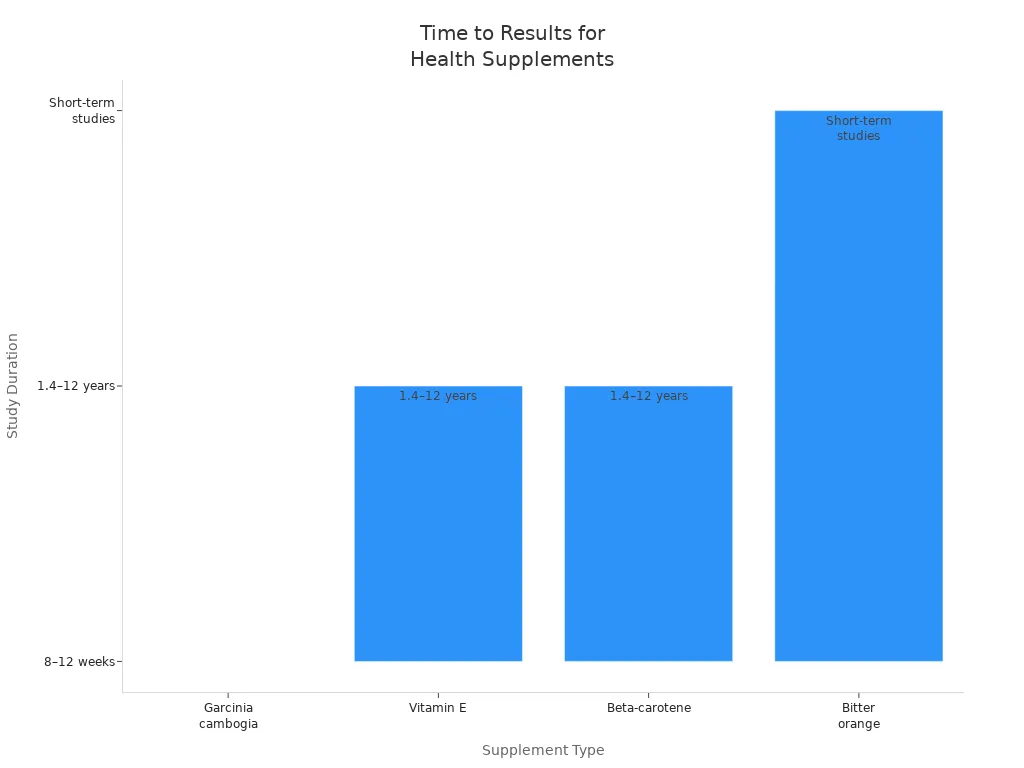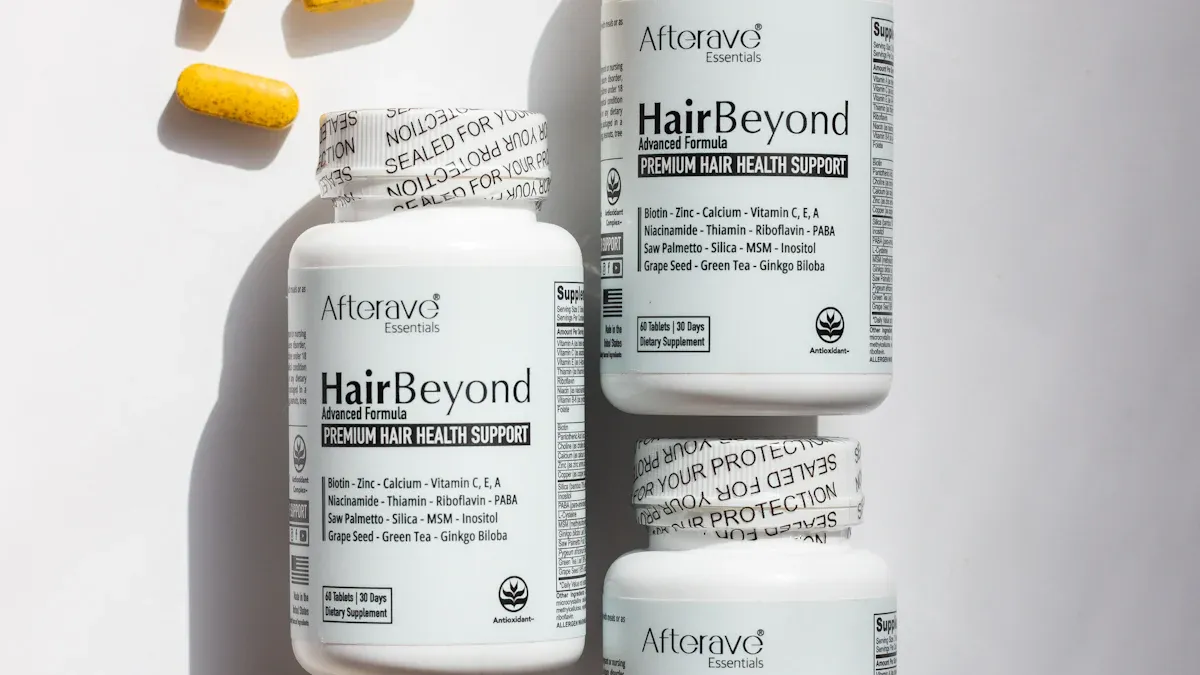Supplements to Work What to Expect in the First Month
Table of Contents

When you start taking supplements to work, you might notice small changes in your energy or mood during the first month. Different supplements to work fill nutritional gaps in unique ways. Some show results faster than others. Timelines can look different for protein or creatine compared to iron or B12. You need consistency to see results.
Timelines may surprise you. Some effects take time, and some supplements to work only show subtle changes at first.
How Supplements to Work in the Body

Absorption and Bioavailability
When you take a supplement, your body starts working right away to break it down and use the nutrients. The process begins in your stomach, where acids and enzymes help dissolve the supplement. Next, it moves to your small intestine. Here, digestive fluids from your liver and pancreas break it down even more. Your body absorbs most nutrients in the small intestine, then sends them through your bloodstream to cells and tissues.
Did you know? The way your body absorbs vitamins depends on their type, your age, and even what you eat with them.
Bioavailability is a fancy word for how much of a nutrient your body can actually use. If a supplement has high bioavailability, your body absorbs more of it. Things like the size of the particles, how the supplement is made, and what you eat can change bioavailability. For example, grapefruit juice can make some nutrients stronger by stopping enzymes that break them down. Your gut bacteria also help with vitamin absorption, but everyone’s gut is a little different.
The form of your supplement matters too. Powders usually absorb faster because they are already dissolved. Capsules and tablets take longer since your body needs to break them down first. Liquids might absorb even faster, but more research is needed. Here’s a quick look at how supplement forms compare:
| Supplement Form | Absorption Speed | Advantages | Limitations |
|---|---|---|---|
| Powder | Fast | Flexible dosing | Taste, measuring needed |
| Capsule | Medium | Easy to swallow | Fillers, swallowing issues |
| Tablet | Slow | Convenient, stable | Slow absorption |
Water-Soluble vs. Fat-Soluble
Different supplements absorb differently in your body. Water-soluble vitamins, like vitamin C and B vitamins, dissolve in water and enter your bloodstream quickly. Your body uses what it needs and gets rid of the rest in your urine. That’s why you need to take these vitamins regularly.
Fat-soluble vitamins, such as A, D, E, and K, need fat and bile acids to break down. They travel through your lymphatic system and get stored in your liver and fat tissues. Because they stick around longer, you don’t need them as often, but taking too much can be risky.
Clinical studies show that water-soluble vitamins usually have higher vitamin absorption rates than fat-soluble ones. Fat-soluble vitamins can build up in your body and may cause problems if you take too much. So, always follow the recommended dose.
How Long Does It Take for Supplements to Work?
You probably want to know when you’ll start seeing results from supplements to work. The answer depends on the type of supplement, your body, and how consistent you are. Some health supplements work fast, while others take time to show their effects. Let’s break down the timelines for different supplements and what you can expect.
How Long Does It Take for Vitamins and Minerals to Work?
If you’re taking vitamins and minerals, you might notice changes in your energy or mood pretty quickly. Water-soluble vitamins like B2, B3, B5, B6, B9, and B12 help fight fatigue and anemia. You could feel a mild energy boost or better sleep within a day. Vitamin C can help with muscle pain and tiredness, sometimes within 24 hours. Iron supplements help with anemia, and you may see improvement as your hemoglobin rises.
Here’s a simple timeline for how long does it take for vitamins and minerals to work:
| Time After Starting Supplementation | Expected Effects on Energy and Deficiency Symptoms |
|---|---|
| 1 day | Mild energy boost, better sleep, improved digestion |
| 1 week | More energy, better mood, less inflammation |
| 2 weeks | Healthier skin and nails, less pain, improved energy |
| 1 month | Most deficiencies improved, greater alertness |
| 3 months | Full absorption, stronger bones, steady energy |
| 1 year | Balanced nutrients, lower disease risk, better well-being |
Tip: If you don’t notice any results after a month, you might need to check your dosage or talk to a doctor.
How Long Does It Take for Vitamins to Work?
You might wonder how long does it take for vitamins to work. The answer depends on the vitamin and your body’s needs. Water-soluble vitamins work fast. You could feel better in a few days or weeks. For example, vitamin B6 and iron together can improve fatigue in about 8 days. Vitamin B5 helps with tiredness and headaches after 4 weeks. Vitamin D, which is fat-soluble, usually takes about a week to start working, but you’ll see full benefits in a month.
Let’s look at a chart that shows how vitamin supplements impact energy and deficiency symptoms over time:

If you’re taking health supplements for a specific deficiency, you may notice results faster. For general wellness, it can take longer. The key is to stay consistent and track your progress.
Short-Term vs. Long-Term Health Supplements
Not all health supplements work the same way. Some give you quick results, while others need more time. Short-term supplements, like Garcinia cambogia, may show minor effects in 8–12 weeks. You might lose a little weight or see small changes in your body. Long-term supplements, such as vitamin E or beta-carotene, often need years to show any benefits. Some studies even show no clear results or possible risks after years of use.
Here’s a table comparing short-term and long-term health supplements:
| Supplement Type | Study Duration | Observed Effects / Results |
|---|---|---|
| Garcinia cambogia | 8–12 weeks | Minor weight loss, small BMI and fat percentage changes |
| Vitamin E | 1.4–12 years | No consistent heart health benefit; some risk reduction |
| Beta-carotene | 1.4–12 years | Slight increase in heart risk |
| Bitter orange | Short-term studies | No proof of effectiveness; possible serious side effects |

Note: Short-term health supplements may give you quick results, but long-term supplements often need patience and may not always deliver clear benefits.
Supplementation Timelines for Common Supplements
You might be curious about how long it takes for popular supplements to work. Here’s a table with supplementation timelines and what you can expect:
| Supplement | Time Frame for Measurable Effects | Measurable Effects Description |
|---|---|---|
| Creatine | 5 days (muscle creatine increase), weeks to month | Rapid muscle creatine increase; cognitive and heart benefits in weeks to a month |
| Omega-3 | 12 months (initial), 30 months (significant) | Cognitive improvements in older adults; significant effects at 30 months |
| Collagen | Weeks to months (with resistance training) | Stronger tendons and knees with exercise; no effect alone |
| Fertility (Spermidine) | N/A (animal models only) | Improved fertility in aging mice; no clear human timeline |
| Protein | N/A | No specific timeline found |
| Multivitamins | N/A | No specific timeline found |
| Magnesium | N/A | No specific timeline found |
| Iron | N/A | No specific timeline found |
| Vitamin B12 | N/A | No specific timeline found |
You’ll see that some supplements to work, like creatine, can show results in just days, while others, like omega-3, need months or even years. Collagen works best when you combine it with exercise. For protein, multivitamins, magnesium, iron, and B12, the timelines are less clear, but you should still track your progress.
Remember: Timelines for health supplements can vary. Some show results in days or weeks, while others require months or years. Stay patient and keep an eye on how you feel.
Factors That Affect Results
Supplement Type
You might wonder why some health supplements work faster than others. The type of supplement you choose plays a big role in how quickly you see results. For example, hydrolyzed collagen peptides absorb easily and start showing benefits in your skin and joints within 4 to 6 weeks. If you keep taking them, you’ll notice even more improvements after 3 months. Here’s a quick look at how collagen supplements work over time:
| Timeline Stage | Supplement Type | Observable Benefits |
|---|---|---|
| 4-6 Weeks | Hydrolyzed Collagen Peptides | Improved skin hydration and texture, faster nail growth, enhanced hair thickness |
| 8-12 Weeks | Hydrolyzed Collagen Peptides | Better skin elasticity, fewer wrinkles, improved joint mobility |
| 3 Months and Beyond | Hydrolyzed Collagen Peptides | Long-lasting skin hydration, stronger joints, continued hair and nail benefits |
Different health supplements fill nutritional gaps in unique ways. Some, like collagen, work slowly but steadily. Others, such as vitamin C or B12, may give you a boost in just a few days. The factors that affect vitamin efficacy include how your body absorbs and uses each supplement.
Individual Health and Diet
Your own health and what you eat can change how well health supplements work for you. If you already eat a balanced diet, you might not need as many supplements to fill nutritional gaps. People who feel tired or want to boost their immune system often turn to supplements for help. Your body’s needs are different from everyone else’s, so your results may not match someone else’s. If you exercise regularly, you may notice changes faster, but having a disease doesn’t always mean you’ll need more supplements. Eating well can make health supplements more effective and help you reach your goals.
Consistency and Tracking
Sticking to your routine is key if you want to see results from health supplements. Most athletes who take supplements and keep healthy habits report better performance and faster recovery. You can improve your effectiveness by taking your supplements every day and pairing them with good nutrition. Tracking your progress helps you notice changes and adjust your plan if needed.
Here are some easy ways to track your progress:
- Keep a wellness journal to write down changes in energy, mood, or health.
- Get blood tests to check your nutrient levels.
- Talk to a healthcare professional about your results and get advice.
- Use pill organizers and set reminders to help you remember your supplements.
- Pair your supplement intake with daily habits, like breakfast or brushing your teeth.
- Store supplements where you can see them, but keep them safe and dry.
Give yourself time—sometimes it takes weeks or months to see real changes. If you don’t notice any results, talk to a healthcare professional. They can help you adjust your plan and make sure you’re getting the most out of your health supplements.
First Month Timeline

Week 1: Initial Changes
You just started taking health supplements. You might feel a small boost in energy or notice your mood lifting. Some people report better sleep or less muscle soreness. Your digestion could improve, and you may feel less bloated. If you take iron or B12, you might see early symptom relief from tiredness. Most changes are mild, but they show your body is beginning to adjust. Keep track of how you feel each day.
Tip: Stay consistent with your routine. Early changes set the stage for bigger improvements.
Week 2: Subtle Effects
During the second week, you may notice subtle effects inside your body. Improved skin hydration is common, especially if your health supplements contain hyaluronic acid. Your skin might feel softer, even if you do not see visible changes yet. Internal adjustments continue, helping your body hold more water and support skin health. You could also notice more regular digestion or slight symptom relief in your joints.
- Look for small changes in how your skin feels.
- Pay attention to your energy and mood.
Week 3: Noticeable Improvements
By the third week, you often experience beneficial effects like increased energy and a brighter mood. Your body starts responding to the nutrients, and you may feel more alert during the day. Some people find their focus improves, and their workouts feel easier. If you take health supplements for fertility, bigger changes may take longer, but you could notice unexpected benefits in your heart or brain first.
Consistency matters. Stick with your supplement effects timeline to get the best results.
Week 4: Review and Adjust
Now you have used health supplements for a month. Review your progress. Write down any changes in energy, mood, digestion, or skin. Some supplements need more time, so do not worry if you do not see big results yet.
| What to Review | Signs to Look For |
|---|---|
| Energy levels | More stamina, less fatigue |
| Mood | Feeling happier |
| Digestion | Fewer stomach issues |
| Skin | Softer, more hydrated |
| Symptom relief | Less pain or discomfort |
If you do not experience beneficial effects, check your dosage or talk to a healthcare professional. Timelines for health supplements vary, and some may not show results in the first month. Stay patient and keep tracking your progress.
Tips for Health Supplements Success
Take with Food When Needed
You can boost the effectiveness of many supplements just by taking them at the right time. Fat-soluble vitamins like A, D, E, and K work best when you take them with meals that have some healthy fat. For example, you might take vitamin D with a glass of milk or a spoonful of yogurt. Multivitamins also absorb better with food and can help prevent an upset stomach. If you take calcium, check the type. Calcium carbonate needs food for your body to absorb it, but calcium citrate works with or without food. Water-soluble vitamins, like B and C, do not need fat, but you might still want to take them with a meal to avoid stomach discomfort.
Tip: Always read the label and ask your doctor if you are unsure about the best way to take your supplements.
Stay Consistent
You will see the most benefits from your supplements if you take them regularly. Your body needs a steady supply of nutrients to work at its best. For example, if you take protein or creatine, spread your intake throughout the day instead of taking a large amount at once. This helps your muscles grow and recover better. Missing doses or taking supplements only when you remember can lower their effectiveness.
- Set a daily reminder on your phone.
- Use a pill organizer to keep track.
- Pair your supplement routine with another habit, like breakfast.
Monitor and Adjust
Tracking your progress helps you get the most out of your supplements. Start by setting clear health goals, like having more energy or improving your skin. Write down how you feel each week. You can also use blood tests to check your nutrient levels. If you do not notice any changes after a month, talk to a healthcare professional. They can help you adjust your dosage or switch to a different supplement.
Here is a simple checklist to help you monitor your routine:
| Step | What to Do |
|---|---|
| Set goals | Choose what you want to improve |
| Track symptoms | Write down changes you notice |
| Check progress | Use tests or talk to your doctor |
| Adjust as needed | Change dose or supplement if needed |
Remember, your health journey is personal. What works for someone else may not work for you. Stay patient and keep checking your progress to maximize the effectiveness of your routine.
You can expect small but important changes in your first month with supplements. Staying patient and consistent helps your body adjust and get the most out of each dose.
- Keep a steady routine so nutrients build up and work together.
- Track your progress and celebrate small wins.
- Talk with a healthcare professional for advice that fits your needs.
Remember, every step counts. Stick with it, and you’ll set yourself up for long-term health success!
FAQ
How soon will I feel changes after starting supplements?
You might notice small changes in energy or mood within a week. Some supplements take longer. Stay consistent and track how you feel each day.
Can I take different supplements together?
You can take several supplements at once. Always check the labels. Some work better with food. Ask your doctor if you are unsure.
What should I do if I miss a dose?
Don’t worry if you miss a dose. Take it when you remember. Try to keep a regular routine. Use reminders or a pill organizer to help.
Are there side effects I should watch for?
Some supplements may cause stomach upset or headaches. If you feel sick, stop taking them and talk to your doctor.
Tip: Always follow the recommended dose.

Poseidon
Master of Nutritional Epidemiology, University of Copenhagen, Herbal Functional Nutrition Researcher
Focus: The scientific application of natural active ingredients such as Tongo Ali, Horny Goat Weed, and Maca to sexual health and metabolic regulation.
Core Focus:
Men: Use a combination of Tongo Ali (an energizing factor) + Maca (an energy reserve) to improve low energy and fluctuating libido.
Women: Use a combination of Horny Goat Weed (a gentle regulator) + Maca (a nutritional synergist) to alleviate low libido and hormonal imbalances.
Stressed/Middle-Aged Adults: This triple-ingredient synergy supports metabolism, physical strength, and intimacy.
Product Concept:
Based on traditional applications and modern research (e.g., Tongo Ali promotes testosterone-enhancing enzyme activity, and icariin provides gentle regulation), we preserve core active ingredients and eschew conceptual packaging—using natural ingredients to address specific needs.
Simply put: I'm a nutritionist who understands "herbal actives." I use scientifically proven ingredients like Tongo Ali, Epimedium, and Maca to help you make "sexual health" and "nutritional support" a daily routine.
